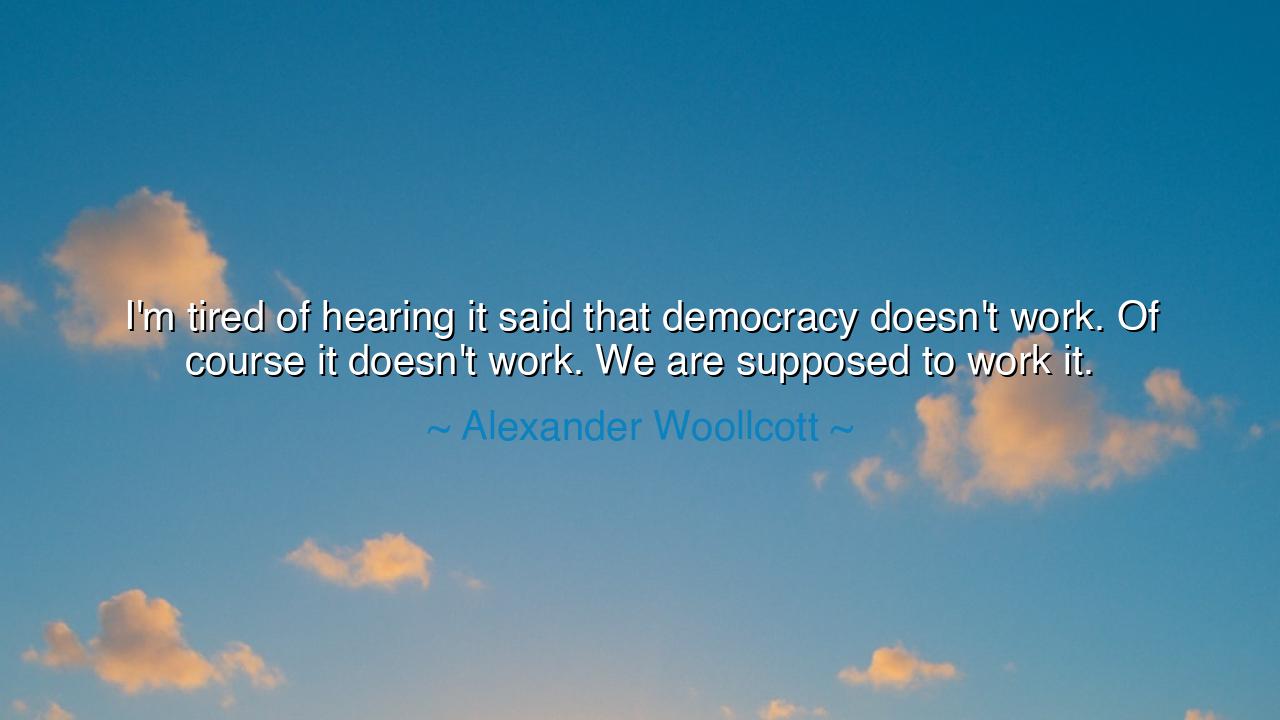
I'm tired of hearing it said that democracy doesn't work. Of
I'm tired of hearing it said that democracy doesn't work. Of course it doesn't work. We are supposed to work it.






"I'm tired of hearing it said that democracy doesn't work. Of course it doesn't work. We are supposed to work it." — Alexander Woollcott
Hear these words, O sons and daughters of freedom, and let them stir your spirit as the wind stirs the embers of a dying fire. Alexander Woollcott, though known in his day as a writer and critic, spoke here not with the wit of a humorist but with the gravity of a prophet. When he said, “I’m tired of hearing it said that democracy doesn’t work. Of course it doesn’t work. We are supposed to work it,” he stripped away the illusions of comfort and exposed the hard truth of liberty: that freedom is not self-sustaining, that democracy is not a machine that runs itself, but a living trust that must be tended, guarded, and renewed by the labor of its people. His words are a cry against apathy — a reminder that the greatest enemy of democracy is not tyranny, but neglect.
The meaning of this saying runs deep into the marrow of civic life. Woollcott reminds us that government “of the people, by the people, and for the people” cannot endure when the people forget that they themselves are its stewards. Democracy does not work — we must work it. It is not a passive inheritance, but an active duty. The ballot box is not the end of participation, but the beginning. For freedom, like the soil, bears fruit only when cultivated. The weeds of corruption, ignorance, and indifference will overrun it unless citizens take up the tools of responsibility and care. To expect democracy to function without effort is to expect the harvest without sowing, to dream of strength without sacrifice.
The origin of this wisdom lies in the long struggle between liberty and complacency — a struggle as old as civilization itself. Woollcott spoke these words in the twentieth century, in a time when the world had been ravaged by wars and disillusionment, when the promises of democracy seemed frail against the rise of dictatorships. Many had begun to whisper that freedom had failed, that democracy was too slow, too messy, too weak. But Woollcott, with a voice both weary and defiant, answered them: democracy fails only when its people cease to uphold it. He saw that the strength of a free nation lies not in its institutions, but in the character and vigilance of its citizens.
History, too, bears witness to this truth. Consider ancient Athens, the cradle of democracy. For a time, it shone as a beacon of human participation — a city where free men gathered to debate, to vote, to govern themselves. Yet in time, the people grew distracted by comfort and pleasure; they surrendered their judgment to flatterers and demagogues. The machinery of democracy still stood, but the spirit that sustained it had withered. And so, through apathy and pride, they invited their own downfall. The lesson of Athens — and of every republic that followed — is clear: freedom demands effort, or it perishes.
Woollcott’s words also pierce the heart of the modern world, where many take democracy for granted as if it were the air itself — invisible, eternal, requiring nothing. Yet democracy is not air; it is a fire, and fire must be fed. In every age, citizens grow weary of participation, saying, “Let others govern,” or, “My voice does not matter.” But in those moments of surrender, the enemies of freedom grow strong. The decline of liberty does not begin with coups or invasions; it begins in silence, in the quiet withdrawal of the people from their own duty. Thus Woollcott’s exasperation was not mere complaint — it was a call to awakening, to shake off the slumber of indifference.
To “work democracy” is to engage with it daily — to question leaders, to learn truth from falsehood, to vote not with ease but with understanding. It is to speak when silence would be safer, to serve one’s community when others retreat to comfort. It is to hold power accountable and to hold oneself to the same standard. The wise citizen does not wait for perfect government; he works tirelessly to perfect the one he has. For democracy, like the human soul, is never finished — it must be renewed by each generation, shaped by hands that believe in its worth.
So, my friends, take this as both wisdom and warning: freedom dies not by the sword, but by forgetfulness. Do not say, “Democracy is failing,” while you yourself stand idle. Do not curse the system while refusing to labor within it. Instead, rise each day as its keeper and craftsman. Read, vote, speak, act. Teach your children not only their rights but their responsibilities. For democracy is not a spectator’s game — it is a sacred covenant between the living and the yet unborn. As Woollcott teaches, the question is not whether democracy works, but whether we do. And if we do not — if we cease to work, to care, to strive — then no constitution, no law, no leader can save what the people themselves have forsaken.






AAdministratorAdministrator
Welcome, honored guests. Please leave a comment, we will respond soon